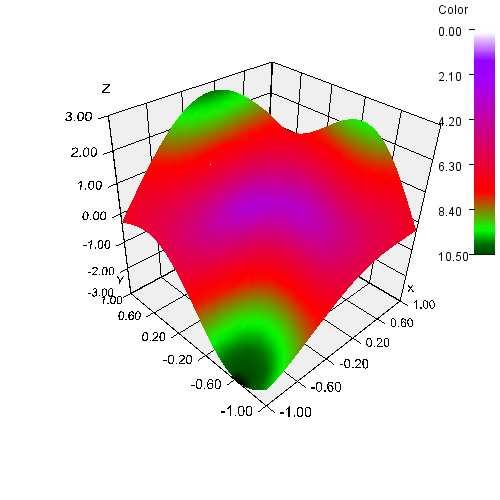The Surface class is used to draw a surface. Surfaces can be specified either by an interface defining a function over a rectangle or by a set of points in three dimensions.
If a function defined over a rectangle is used, the function is evaluated on a rectangular grid of points. The resulting quadrilaterals are plotted.
Shaded Surface
This example shades a surface with a user-specified function, instead of using shading. The same function is used as in the previous example: z = 2sin (x + y) - cos (2x - 3y) over the square [-1,1] by [-1,1].
The shade Color function uses a Colormap object from the com.imsl.chart package. This maps a parameter to a Color. In this example the surface is colored using the function t = x2 + y2 + z2.
The function value is scaled to a Colormap parameter using s = t1/4 / 1.8.
The chart also includes a ColormapLegend, which is drawn on the background. It is positioned 5 pixels from the right edge and 5 pixels from the top edge of the canvas (see Canvas3DChart).
import com.imsl.chart3d.*;
import com.imsl.chart.Colormap;
public class SampleShadedSurface extends JFrameChart3D
implements Surface.ZFunction, ColorFunction {
private Colormap colormap = Colormap.GREEN_RED_BLUE_WHITE;
public SampleShadedSurface() {
Chart3D chart = getChart3D();
AxisXYZ axis = new AxisXYZ(chart);
Surface surface =
new Surface(axis, this, -1.0, 1.0, -1.0, 1.0);
surface.setColorFunction(this);
surface.setSurfaceType(Surface.SURFACE_TYPE_NICEST);
double maxColor = Math.pow(1.8,4);
ColormapLegend colormapLegend =
new ColormapLegend(chart, colormap, 0., maxColor);
colormapLegend.setTitle("Color");
colormapLegend.setPosition(-5, 5);
render();
}
public double f(double x, double y) {
return 2*Math.sin(x+y) - Math.cos(2*x-3*y);
}
public java.awt.Color color(double x, double y, double z) {
double t = x*x + y*y + z*z ;
double s = Math.pow(t, 0.25) / 1.8;
return colormap.color(s);
}
public static void main(String args[]) {
new SampleShadedSurface().setVisible(true);
}
}

|
PHONE: 713.784.3131 FAX:713.781.9260 |